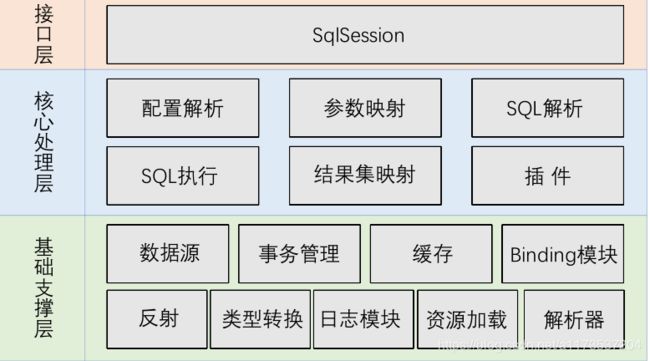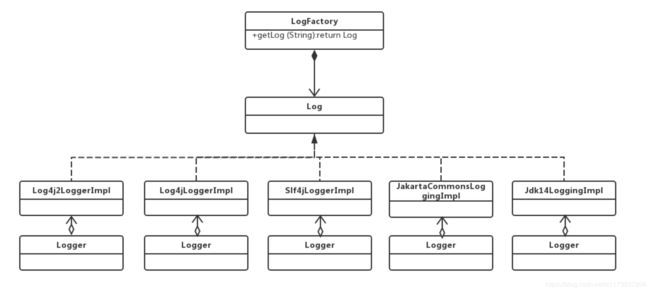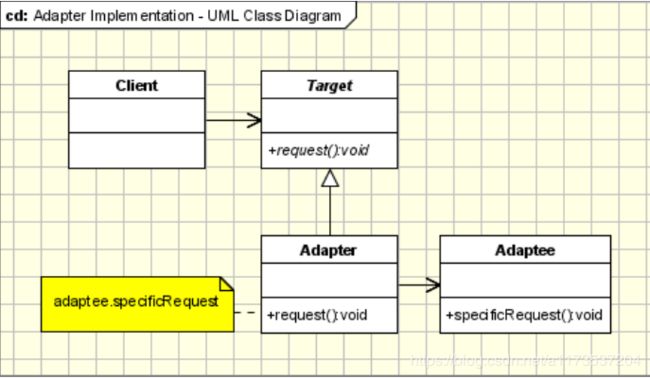Mybatis源码分析(十七) - 源码包分析【日志模块】
mybatis源码下载地址:https://github.com/mybatis/mybatis-3
MyBatis源码导入过程:
- 下载MyBatis的源码
- 检查maven的版本,必须是3.25以上,建议使用maven的最新版本
- mybatis的工程是maven工程,在开发工具中导入,工程必须使用jdk1.8以上版本;
- 把mybatis源码的pom文件中
true ,全部改为false; - 在工程目录下执行 mvn clean install -Dmaven.test.skip=true,将当前工程安装到本地仓库(pdf插件报错的话,需要将这个插件屏蔽);
- 其他工程依赖此工程
mybatis整体架构
日志模块
- MyBatis没有提供日志的实现类,需要接入第三方的日志组件,但第三方日志组件都有各自的Log级别,且各不相同,二MyBatis统一提供了trace、debug、warn、error四个级别;
- 自动扫描日志实现,并且第三方日志插件加载优先级如下:slf4J → commonsLoging → Log4J2 → Log4J→ JdkLog;
- 日志的使用要优雅的嵌入到主体功能中;
日志模块类图
这里需要提到一种设计模式
适配器模式
适配器模式(Adapter Pattern)是作为两个不兼容的接口之间的桥梁,将一个类的接口转换成客户希望的
另外一个接口。适配器模式使得原本由于接口不兼容而不能一起工作的那些类可以一起工作;
Target:目标角色,期待得到的接口.
Adaptee:适配者角色,被适配的接口.
Adapter:适配器角色,将源接口转换成目标接口.
适用场景:当调用双方都不太容易修改的时候,为了复用现有组件可以使用适配器模式;在系统中接入第三方组
件的时候经常被使用到;
注意:如果系统中存在过多的适配器,会增加系统的复杂性,设计人员应考虑对系统进行重构;
LogFactory
/**
* Copyright ${license.git.copyrightYears} the original author or authors.
*
* Licensed under the Apache License, Version 2.0 (the "License");
* you may not use this file except in compliance with the License.
* You may obtain a copy of the License at
*
* http://www.apache.org/licenses/LICENSE-2.0
*
* Unless required by applicable law or agreed to in writing, software
* distributed under the License is distributed on an "AS IS" BASIS,
* WITHOUT WARRANTIES OR CONDITIONS OF ANY KIND, either express or implied.
* See the License for the specific language governing permissions and
* limitations under the License.
*/
package org.apache.ibatis.logging;
import java.lang.reflect.Constructor;
/**
* @author Clinton Begin
* @author Eduardo Macarron
*/
public final class LogFactory {
/**
* Marker to be used by logging implementations that support markers
*/
public static final String MARKER = "MYBATIS";
//被选定的第三方日志组件适配器的构造方法
private static Constructor logConstructor;
//自动扫描日志实现,并且第三方日志插件加载优先级如下:slf4J → commonsLoging → Log4J2 → Log4J → JdkLog
static {
tryImplementation(LogFactory::useSlf4jLogging);
tryImplementation(LogFactory::useCommonsLogging);
tryImplementation(LogFactory::useLog4J2Logging);
tryImplementation(LogFactory::useLog4JLogging);
tryImplementation(LogFactory::useJdkLogging);
tryImplementation(LogFactory::useNoLogging);
}
private LogFactory() {
// disable construction
}
public static Log getLog(Class aClass) {
return getLog(aClass.getName());
}
public static Log getLog(String logger) {
try {
return logConstructor.newInstance(logger);
} catch (Throwable t) {
throw new LogException("Error creating logger for logger " + logger + ". Cause: " + t, t);
}
}
public static synchronized void useCustomLogging(Class clazz) {
setImplementation(clazz);
}
public static synchronized void useSlf4jLogging() {
setImplementation(org.apache.ibatis.logging.slf4j.Slf4jImpl.class);
}
public static synchronized void useCommonsLogging() {
setImplementation(org.apache.ibatis.logging.commons.JakartaCommonsLoggingImpl.class);
}
public static synchronized void useLog4JLogging() {
setImplementation(org.apache.ibatis.logging.log4j.Log4jImpl.class);
}
public static synchronized void useLog4J2Logging() {
setImplementation(org.apache.ibatis.logging.log4j2.Log4j2Impl.class);
}
public static synchronized void useJdkLogging() {
setImplementation(org.apache.ibatis.logging.jdk14.Jdk14LoggingImpl.class);
}
public static synchronized void useStdOutLogging() {
setImplementation(org.apache.ibatis.logging.stdout.StdOutImpl.class);
}
public static synchronized void useNoLogging() {
setImplementation(org.apache.ibatis.logging.nologging.NoLoggingImpl.class);
}
private static void tryImplementation(Runnable runnable) {
if (logConstructor == null) {//当构造方法不为空才执行方法
try {
runnable.run();
} catch (Throwable t) {
// ignore
}
}
}
//通过指定的log类来初始化构造方法
private static void setImplementation(Class implClass) {
try {
Constructor candidate = implClass.getConstructor(String.class);
Log log = candidate.newInstance(LogFactory.class.getName());
if (log.isDebugEnabled()) {
log.debug("Logging initialized using '" + implClass + "' adapter.");
}
logConstructor = candidate;
} catch (Throwable t) {
throw new LogException("Error setting Log implementation. Cause: " + t, t);
}
}
}
Log4jImpl类
/**
* Copyright ${license.git.copyrightYears} the original author or authors.
*
* Licensed under the Apache License, Version 2.0 (the "License");
* you may not use this file except in compliance with the License.
* You may obtain a copy of the License at
*
* http://www.apache.org/licenses/LICENSE-2.0
*
* Unless required by applicable law or agreed to in writing, software
* distributed under the License is distributed on an "AS IS" BASIS,
* WITHOUT WARRANTIES OR CONDITIONS OF ANY KIND, either express or implied.
* See the License for the specific language governing permissions and
* limitations under the License.
*/
package org.apache.ibatis.logging.log4j;
import org.apache.ibatis.logging.Log;
import org.apache.log4j.Level;
import org.apache.log4j.Logger;
/**
* @author Eduardo Macarron
*/
public class Log4jImpl implements Log {
private static final String FQCN = Log4jImpl.class.getName();
private final Logger log;
public Log4jImpl(String clazz) {
log = Logger.getLogger(clazz);
}
@Override
public boolean isDebugEnabled() {
return log.isDebugEnabled();
}
@Override
public boolean isTraceEnabled() {
return log.isTraceEnabled();
}
@Override
public void error(String s, Throwable e) {
log.log(FQCN, Level.ERROR, s, e);
}
@Override
public void error(String s) {
log.log(FQCN, Level.ERROR, s, null);
}
@Override
public void debug(String s) {
log.log(FQCN, Level.DEBUG, s, null);
}
@Override
public void trace(String s) {
log.log(FQCN, Level.TRACE, s, null);
}
@Override
public void warn(String s) {
log.log(FQCN, Level.WARN, s, null);
}
}
结合上面的适配模式可以分析,Log4jImpl就是Apdater类,Log接口就是Target
LoggerFactory.getLogger(clazz)这个操作就是获取 org.apache.log4j.Logger 他就是Adaptee类


